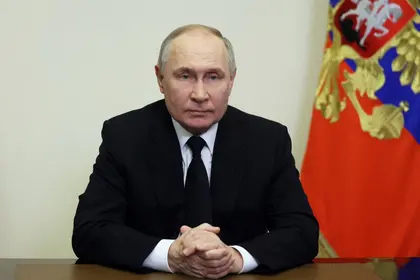Russian President Vladimir Putin addressed Russians 20 hours after the terrorist attack on a Moscow concert hall (“Crocus City Hall”).
In a televised address, he confirmed that 11 people were detained, including four directly involved in the attack at the concert hall. Putin linked the attack at “Crocus City Hall” with Ukraine.
“They (terrorists) tried to escape and were moving towards Ukraine, where, according to preliminary information, a window was prepared for them from the Ukrainian side to cross the state border,” he said.
JOIN US ON TELEGRAM
Follow our coverage of the war on the @Kyivpost_official.
Putin announced that special services are actively working to identify accomplices of the terrorists. In response to the attack in Moscow and the region, as well as across the country, he declared the implementation of “additional measures of an anti-terrorist and anti-sabotage nature.”
Putin likened this terrorist attack to “the crimes of the Nazis in the occupied territories,” emphasizing that “all those responsible, organizers, and instigators of this crime will face a fair and inevitable punishment, whoever they are, whoever directed them.”
Furthermore, the Russian president declared March 24 as a national day of mourning.
According to reports from the Meduza Russian media outlet, citing sources from two separate Russian media organizations, the Kremlin mandated that state-owned and government-loyal media highlight the "Ukrainian connection" in their coverage of the terrorist attack at the concert hall.

Azerbaijan Mourns 38 Losses in Jet Crash as Experts Suspect Russian Air Defense Downed Plane
The Federal Security Service (FSB) of Russia released a statement in the morning of March 23 suggesting a potential “Ukrainian connection” to the Moscow terrorists.
The FSB claimed that following the attack, the suspects allegedly planned to cross the heavily guarded Russian-Ukrainian border, currently one of the most secure and challenging borders in Europe. The FSB also alleged that the detainees had “relevant contacts on the Ukrainian side.”
Responding to these claims, Andrii Yusov, a representative of the Main Intelligence Directorate (HUR) of the Ministry of Defense, dismissed the FSB's statements as “absurd.”
“These assertions by the FSB are aimed either at the misinformed or the indoctrinated Russian population,” he said.
“To suggest that after more than two years of a full-scale invasion, terrorists would head towards border regions that are currently highly saturated with security forces, special services, and military presence, I believe no further comment is necessary,” Yusov added.
He said that the FSB's accusations are “falsehoods and an effort by the Russian regime to divert Ukrainian attention, a tactic they have employed since the initial moments of this terrorist attack.”
The Islamic State – Khorasan Province (ISIS–K), a regional branch of the Islamic State terrorist group active in South-Central Asia, claimed responsibility for the attack. The US State Department, according to a BBC “verify” service report, considered this claim likely to be true.
Ukraine's presidency and Foreign Ministry firmly denied any involvement in the attack, with its military intelligence labeling the incident a Russian “provocation” and alleging potential involvement of Moscow's special services.
Kyiv rejected Russian claims of a Ukrainian link to the attack on a Moscow concert hall, which resulted in the deaths of over 100 people.
“The assertions made by Russian special services regarding Ukraine are entirely baseless and absurd,” stated Mykhaylo Podolyak, an aide to Ukrainian President Volodymyr Zelensky.
You can also highlight the text and press Ctrl + Enter






